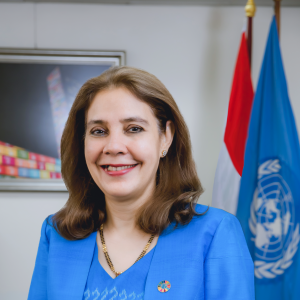Ibu Penny Director, Socio-Cultural Affairs and International Organization of Developing Countries, Ministry of Foreign Affairs,
Bapak Judha Nugraha, Director for the Protection of Citizens, MOFA
Ibu Nuryani Yunus, Deputy Assistant on Employment Ecosystem Harmonization, Coordinating Ministry for Economic Affairs
Bapak Ir. Prijadi Santoso, Assistant Deputy for Protection of Women's Rights in Employment and Trafficking in Persons, the Ministry of Women's Empowerment and Child Protection
Representatives from Line Ministries, development partners, recruitment agencies, and UN colleagues
Selamat Pagi.
Let me begin by thanking the main lead of the Migration Governance in Indonesia, the Ministry of Foreign Affairs and the Local Government of Central Java, and the institutions involved in the partnership we have forged for safe and orderly migration, which is vital to broad-based SDG acceleration.
Indonesia is a front runner as a champion country of the global compact for migration by investing in protection, safe labour practices and boosting mutual skills recognition.
Your leadership has enabled the adoption of a whole of government approach, with the finalisation of the national action plan and Migration Governance Indicators for evidence-based migration policies.
This leverages the development potential of 2.2 million Indonesian migrant workers, majority of whom are women and potentially vulnerable to exploitation and violence.
Collectively, they contribute to securing wellbeing of families and growth of the economy, by bringing to bear nearly $10 billion, which is close to a percent of the GDP of the country.
Analysis suggests that this is set to grow even further as Indonesia positions to upskill its migrant labour.
I am new to the country and participating in this discussion is a great learning opportunity.
Let me highlight three themes that I believe are imperative as UN strategically brings its breadth of expertise through IOM, UNDP and UN Women for taking safe, orderly and regular migration to its next level.
First, the launch of the migration governance index for Indonesia and Central Java led by MoFA and IOM is setting the pathway to comprehensively address challenges that migrants face. This will also strategically bridge policy gaps as a driver for greater protection across the migration continuum.
It is a valuable tool to assess and monitor migration related policies and practices (52) and a basis for collaboration with stakeholders, including the private sector and specifically recruitment agencies.
The MGI report from Central Java helps us understand with deeper granularity the migration dynamics for provinces.
For example, Central Java has the highest placement of migrant workers in the fishing industry. To improve the working condition of migrant fishing vessel crew, the cooperation agreement with the Indonesia Ocean Justice Initiative is seeking to develop specific protection strategies for their wellbeing.
Second, the partnership with local governments and UNDP to mainstream migration into their Regional Medium-Term Development Plans is being scaled up. There is an increasing demand from districts across the three provinces to complement innovative financing to support migrant workers across the continuum as important economic stakeholders.
This directly impacts household security and that of communities given that many of these workers can face economic stress in their mobility pathway.
Third, the MoFA-UN Women partnership is leveraging Safe Travel Mobile application with an in-built AI chatbot to protect women migrant workers. It will ensure end-to-end protection of Indonesian migrant workers with greater access to the criminal justice system in the local language from a trusted source.
The UN in partnership with the Government stands ready to scale up dialogue with the private sector to further strengthen the ecosystem for recruitment of migrant workers, expand the use of digitised contracts and payment mechanisms, while scaling up skills training.
Let me conclude with commending the MoFA, Manpower Department of Central Java, and IOM for demonstrating how vertical and horizontal policy coherence can be strengthened to make safe and orderly migration a reality for Indonesia.
Terima kasih




